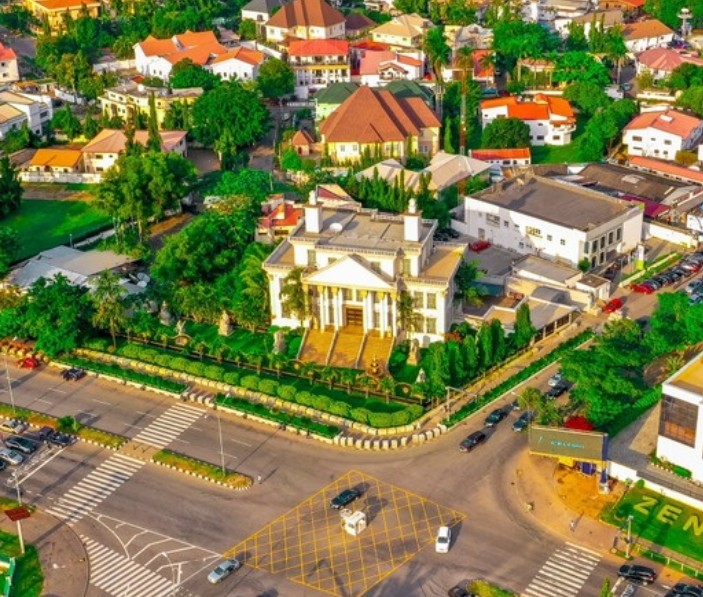Abuja’s land market is a study in contrasts: leafy, ultra-premium districts that host embassies and government elites sit within driving distance of fast-growing, value-for-money suburbs that attract families and first-time investors.
This piece breaks the market down for buyers and investors who type “land for sale in Abuja” into search bars, what to expect, where value sits today, and how to read price signals so you buy smart.
Property portals and market trackers list huge price dispersion across the Federal Capital Territory, average land listings span a very wide range depending on location, from modest plots in outlying districts to multi-hundred-million-naira parcels in Phase 1 areas.
Aggregated listing sites show average asking-price signals that vary by data set, but the clear pattern is the same: prime districts command a premium many times higher than peripheral estates.
How I scored neighbourhoods: Quick and Practical framework
To keep recommendations actionable, I scored each area (1–10) on four easy-to-compare metrics:
Affordability: lower is always better for buyers on a budget.
Infrastructure & services: roads, power, water, schools, hospitals.
Security & prestige: how safe and established the area is.
Investment upside: likelihood of price appreciation and/or demand
Scores are not absolute valuations but an investor/house-hunter shortcut. Where possible, I back opinions with listing averages or market commentary.
Quick reads on the top areas scores as follow
1. Maitama — Score: 9/10 (Affordability 2 | Infrastructure 10 | Security 10 | Upside 8)
Why consider it: Maitama is synonymous with prestige; embassies, top hotels, proximity to government institutions, and premium infrastructure. Expect the highest per-plot asking prices in the city, and near-zero vacancy for top homes.
If you want status and capital preservation more than bargain hunting, this is the district. Market guides and property portals consistently list Maitama among Abuja’s priciest areas.
Practical: plan for a heavy premium on land; development approvals and security make it attractive to high-net-worth buyers.
2. Asokoro — Score: 9/10 (Affordability 2 | Infrastructure 10 | Security 10 | Upside 8)
Why consider it: Aso-Drive, Asokoro and surrounding streets are comparable to Maitama in prestige and price. It’s the neighbourhood closest to the Presidential Villa and home to many senior officials, so land here trades at the top of the market.
Expect very limited supply and steady demand from buyers who prize location over yield.
3. Wuse / Garki (Central District) — Score: 7.5/10 (Affordability 6 | Infrastructure 8 | Security 7 | Upside 7)
Why consider it: Here is the commercial heart: mixes offices, apartments and some residential plots. Good for buyers who want city convenience, shops, offices and transport links, without the ultra-premium price of Maitama/Asokoro. Suitable for small developers and mixed-use projects.
4. Gwarinpa — Score: 7/10 (Affordability 7 | Infrastructure 7 | Security 7 | Upside 7)
Why consider it: Gwarinpa is one of the largest estates in West Africa and offers family-sized plots and houses at lower entry prices than Phase 1 areas. Good for owner-occupiers and medium-term renters; project developers also target it for volume housing.
Listing sites show many active land offers here at substantially lower asking prices than central districts.
5. Katampe / Katampe Extension — Score: 8/10 (Affordability 6 | Infrastructure 8 | Security 8 | Upside 9)
Why consider it: Katampe has become both a residential favourite and a hot investment play. Local reporting documents fast price appreciation in recent years, examples in market reporting cite sharp jumps in parcel prices year-on-year as infrastructure and demand moved in.
For investors looking for appreciation over 3–5 years, Katampe ranks highly, but I advice you to be selective on exact streets and titles.
6. Lokogoma / Kubwa / Jahi — Score range: 6–7/10 (Affordability 8 | Infrastructure 5–7 | Security 6 | Upside 7)
Why consider it: These are expanding, affordability-led suburbs. Land is cheaper, and many middle-income families build here. If you want to buy now and construct a home for a modest budget, these districts are where you’ll find value.
They also have higher upside if major road or utility projects land. Market guides list Lokogoma among fast-growing, budget-friendly choices.
Price pointers & how to read listed figures
Per-square-metre rates and per-plot asking prices vary widely. Some area guides quote per-sqm ranges (e.g., mid-range districts vs. Katampe or Jahi), use per-sqm only as a sanity check against similar listings.
Aggregator portals list average asking prices but mixes titled land with allocations, serviced plots and speculative offers, always verify title, allocation status, and infrastructure before paying.
Listing averages on major property portals can be useful for trend sense but are not substitute for due diligence.
Investment rules of thumb for “land for sale in Abuja”
Verify the title and who holds the allocation: allocation letters, C of O / certificate, or statutory documentation must be clear, as unclear chain equalizes to big risk.
Factor infrastructure timing into price: the same street can jump when a new road or power line is confirmed. That’s often when neighbouring landowners see the biggest gains. (Recent local coverage shows this dynamic in Katampe.)
Match location to goal: buy Maitama/Asokoro for capital preservation/status; and /or buy Katampe/Lokogoma/Kubwa for growth and affordability; and/or buy Wuse/Garki for rental income/commerce.
Work with Experts: use an agent with local reputation but insist on independent titles checks, as reputable agents also help spot flooded or encumbered parcels.
Why You Should Work with Real Estate Professional on Land Investment in Abuja
Partnering with reputable real estate companies helps investors navigate Abuja’s complex land market with confidence. These professionals provide deep neighborhood insights, tracking infrastructure projects and market trends to highlight areas with strong growth potential.
They also handle critical due diligence, verifying land titles through agencies like the Abuja Geographic Information System (AGIS), checking for encumbrances, and ensuring compliance with government requirements. In addition, they manage negotiations, contracts, and payment processes, and can offer long-term services such as site management or assistance with development permits.
Trusted firms in the city, including Eden and People and Bamboo Group, exemplify the expertise and networks that protect buyers and streamline transactions, allowing investors to focus on strategy while professionals safeguard the legal and procedural details.
Final takeaway for buyers searching “land for sale in Abuja”
If you want status and safety, focus on Maitama and Asokoro and treat land purchase as preservation over immediate yield.
If you want growth at a lower entry price, Katampe and selected outskirts like Lokogoma or Gwarinpa offer the best balance, but do strict title checks and watch infrastructure plans.
Use aggregator portals (they’re good for trend signals), but verify everything on the ground and consult reputable legal counsel before transfer.
Bonus: What Investment Rules of Thumb Means
Investment rules of thumb simply means quick, practical guidelines or general principles that investors use to make decisions without doing an in-depth analysis every time.
Think of them as common-sense shortcuts—tips that are widely accepted because they usually work, even though they’re not hard laws.
For example, in the article, those rules of thumb were things like:
- Always verify the title and ownership of the land.
- Match the location to your goal (status vs. growth).
- Factor in infrastructure plans when judging price.
These aren’t strict regulations; they’re reliable habits or best practices that experienced investors follow to reduce risk and improve their chances of success.
Frequently Asked Questions (FAQs) About Land Sales in Abuja
What documents should I verify before buying land in Abuja?
You need to confirm that the property has a valid Certificate of Occupancy (C of O) or other recognized title (such as a Right of Occupancy or a valid allocation letter). Always verify these with the Abuja Geographic Information System (AGIS) to ensure the land is free from encumbrances, multiple ownership claims, or unpaid ground rent.
How much does land cost in Abuja?
Prices vary dramatically by location and infrastructure. Prime Phase 1 districts like Maitama or Asokoro can run into hundreds of millions of naira per plot, while emerging areas such as Lokogoma, Jahi, or Kubwa offer more affordable options at a fraction of that price. Plot size, road access, and proximity to ongoing development also influence cost.
Is it better to buy from the government or from private sellers?
Buying directly from the government (e.g., through FCDA allocations) can provide clearer titles but involves waiting for application processes and sometimes higher upfront requirements. Private sales are faster but require strict due diligence to confirm the seller’s title and the authenticity of all documents.
Do I need a real estate agent or company to buy land?
It’s not legally required, but using a reputable real estate firm or agent can save time and reduce risk. They assist with market scouting, title verification, negotiation, and contract management, and can connect you with trusted legal and surveying professionals.
What extra costs should I plan for besides the purchase price?
Budget for legal fees, survey fees, AGIS search and registration charges, stamp duty, and development levies (if applicable). Depending on the property’s location and purpose, these can add 5–10% or more to the total investment.
Want a highly reputable media feature for your tech-enabled projects, join Techparley Africa’s #Drive100 for free.






